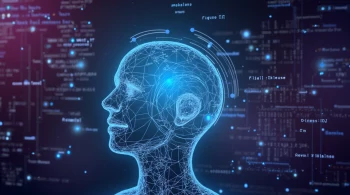Mobile app development has entered a transformative phase with artificial intelligence technologies reshaping every aspect of how we conceptualize, build, and optimize applications for smartphones and tablets. As mobile devices become increasingly central to our digital lives, developers are leveraging AI to create smarter, more personalized, and efficient applications. This evolution is not only changing the development process but also expanding what's possible in the mobile app ecosystem.
The Evolving Landscape of Mobile Programming Languages
The mobile development language ecosystem has traditionally been divided between Swift/Objective-C for iOS and Java/Kotlin for Android. However, AI is now influencing how these languages are used and even blurring the lines between platforms.
Swift and SwiftUI
Apple's Swift language has evolved significantly with each iteration, becoming more expressive and powerful. AI tools now offer intelligent code completion for Swift, suggesting entire functional patterns based on contextual analysis. SwiftUI, Apple's declarative UI framework, is particularly well-suited for AI assistance due to its structured and predictable syntax.
AI-powered tools like GitHub Copilot can now:
- Generate complete SwiftUI views from natural language descriptions
- Suggest performance optimizations for Swift code
- Auto-implement protocol requirements and boilerplate code
- Translate UIKit code to SwiftUI equivalents
Kotlin and Jetpack Compose
For Android development, Kotlin has become the preferred language, especially with Google's Jetpack Compose UI toolkit gaining adoption. AI systems have become remarkably adept at working with Kotlin's syntax and features:
- Generating idiomatic Kotlin code that leverages language-specific features like extension functions and coroutines
- Creating Jetpack Compose UI components from mockups or descriptions
- Converting Java code to modern Kotlin implementations
- Suggesting performance improvements for Android-specific concerns
Cross-Platform Frameworks
React Native, Flutter, and other cross-platform frameworks are seeing particularly impressive AI integration:
- Flutter's Dart language, with its type safety and functional capabilities, works exceptionally well with AI code generation
- React Native's component-based architecture allows AI to efficiently generate and modify discrete UI elements
- AI tools can now suggest platform-specific optimizations while maintaining cross-platform compatibility
How AI is Transforming Mobile Development Workflows
Code Generation for Mobile-Specific Challenges
Mobile development presents unique challenges that AI is increasingly equipped to handle:
- Responsive UI Generation: AI can now generate responsive layouts that adapt to various screen sizes and orientations
- Platform API Integration: Tools can suggest code for integrating with device-specific APIs like camera, GPS, and biometric authentication
- Offline Functionality: AI assistants can generate boilerplate for local data persistence and synchronization
- Battery Optimization: Intelligent suggestions for reducing battery consumption through efficient code patterns
Mobile UI/UX Design
The design phase of mobile app development has been revolutionized by AI tools that can:
- Generate complete UI designs based on brand guidelines and user requirements
- Create animations and transitions that follow platform-specific design principles
- Translate design mockups directly into SwiftUI, Jetpack Compose, or Flutter code
- Suggest accessibility improvements for mobile interfaces
Testing and Quality Assurance
Mobile testing presents unique challenges due to device fragmentation and platform differences. AI now helps by:
- Generating comprehensive test cases for mobile-specific scenarios
- Automating visual testing across multiple device sizes and orientations
- Predicting potential performance issues on different device categories
- Simulating various network conditions to test app resilience
Language-Specific AI Capabilities in Mobile Development
Swift and iOS Development
AI tools have become particularly adept at working with Swift's strong type system and protocol-oriented approach:
- Generating type-safe code that leverages Swift's advanced features
- Creating custom implementations of common iOS design patterns
- Suggesting memory management optimizations to prevent leaks
- Implementing complex animations and transitions in SwiftUI
Apple's Core ML framework allows developers to integrate pre-trained machine learning models directly into iOS apps, with AI assistants now capable of generating the integration code based on simple descriptions of the desired functionality.
Kotlin and Android Development
For Android development with Kotlin, AI assistants excel at:
- Implementing Android architectural patterns like MVVM and Clean Architecture
- Generating coroutine-based asynchronous code for network operations and database access
- Creating custom views and animations that perform well on diverse Android devices
- Suggesting optimizations for Android's activity and fragment lifecycle
JavaScript/TypeScript for React Native
AI tools have developed sophisticated understanding of React Native's component structure:
- Generating functional components with hooks for state management
- Creating custom hooks for reusable logic
- Implementing navigation patterns that work across platforms
- Converting between class components and functional components with hooks
Dart for Flutter
Flutter's Dart language, with its clear syntax and widget-based structure, works particularly well with AI:
- Generating complex widget trees from simple descriptions
- Creating custom animations using Flutter's animation framework
- Implementing state management solutions using providers, Riverpod, or BLoC
- Building responsive layouts that work across mobile, web, and desktop
Emerging Mobile Development Paradigms Powered by AI
No-Code and Low-Code Mobile Development
AI is powering a new generation of no-code and low-code platforms specifically for mobile development:
- Visual development environments that generate native code
- AI-assisted drag-and-drop interfaces that create production-ready applications
- Intelligent systems that can translate business requirements directly into functional mobile apps
- Code generation that follows best practices for the target platform
On-Device Machine Learning
Modern mobile apps increasingly leverage on-device ML capabilities:
- AI assistants can generate code to integrate TensorFlow Lite or Core ML models
- Implementation of complex features like image recognition, voice processing, and natural language understanding
- Optimization of ML models for mobile constraints (processing power, battery, memory)
Predictive User Experiences
AI enables developers to create apps that anticipate user needs:
- Implementation of recommendation systems based on user behavior
- Predictive text input and intelligent form filling
- Contextual feature presentation based on time, location, and user activity
- Personalized content delivery systems
The Future of AI in Mobile App Development
Natural Language Mobile Development
The future points toward natural language interfaces for mobile development:
- Describing complete app features in natural language and having AI generate the implementation
- Conversational debugging and optimization processes
- Voice-controlled development environments specific to mobile platforms
Autonomous Mobile Testing
AI systems will increasingly automate the testing process:
- Autonomous exploration and testing of mobile apps without predefined test cases
- Intelligent crash analysis and automatic fix suggestions
- Performance optimization through machine learning analysis of runtime behavior
Cross-Platform Intelligence
AI will help bridge the gap between platforms:
- Automatic translation of iOS-specific code to Android equivalents and vice versa
- Generation of platform-specific optimizations from generic app descriptions
- Unified testing strategies that account for platform differences
Challenges and Considerations
Code Quality and Maintainability
As with all AI-generated code, mobile developers must vigilantly review output for:
- Performance issues that might be less visible on high-end development devices
- Security vulnerabilities, especially around data storage and transmission
- Maintainability concerns as apps evolve over time
- Compliance with platform-specific guidelines and best practices
Platform-Specific Knowledge
Despite AI assistance, developers still need deep understanding of:
- Platform-specific user experience expectations
- Performance optimization techniques for different device capabilities
- Security and privacy considerations unique to mobile environments
- App store guidelines and requirements
Ethical and Privacy Concerns
Mobile apps often access sensitive user data, raising important considerations:
- Ensuring AI-generated code follows privacy best practices
- Implementing proper permission handling and data protection
- Creating transparent user experiences around data collection
- Adherence to regional privacy regulations like GDPR and CCPA
Conclusion
The integration of AI into mobile app development represents a paradigm shift in how we approach creating applications for smartphones and tablets. By understanding the specific ways AI can enhance work with languages like Swift, Kotlin, JavaScript, and Dart, developers can leverage these tools to create more sophisticated, responsive, and intelligent mobile experiences.
Rather than replacing mobile developers, AI is amplifying their capabilities—handling repetitive tasks while allowing human creativity to focus on innovation, user experience, and solving complex problems. The most successful mobile developers of this era will be those who effectively collaborate with AI systems, understanding both their capabilities and limitations in the mobile context.
As we continue into this new era of AI-assisted mobile development, we can expect even more powerful tools that make development faster, more accessible, and capable of creating applications that would have been impractical to build manually—all while maintaining the human-centered design thinking that makes truly great mobile experiences.
By Rafayel Tobelyan
Founder @ DiNeuron | Co-Founder&CTO @ Amazing Labs | Founder @ Turn.am | Entrepreneur, Principal Software & Blockchain Engineer | Crypto Expert




